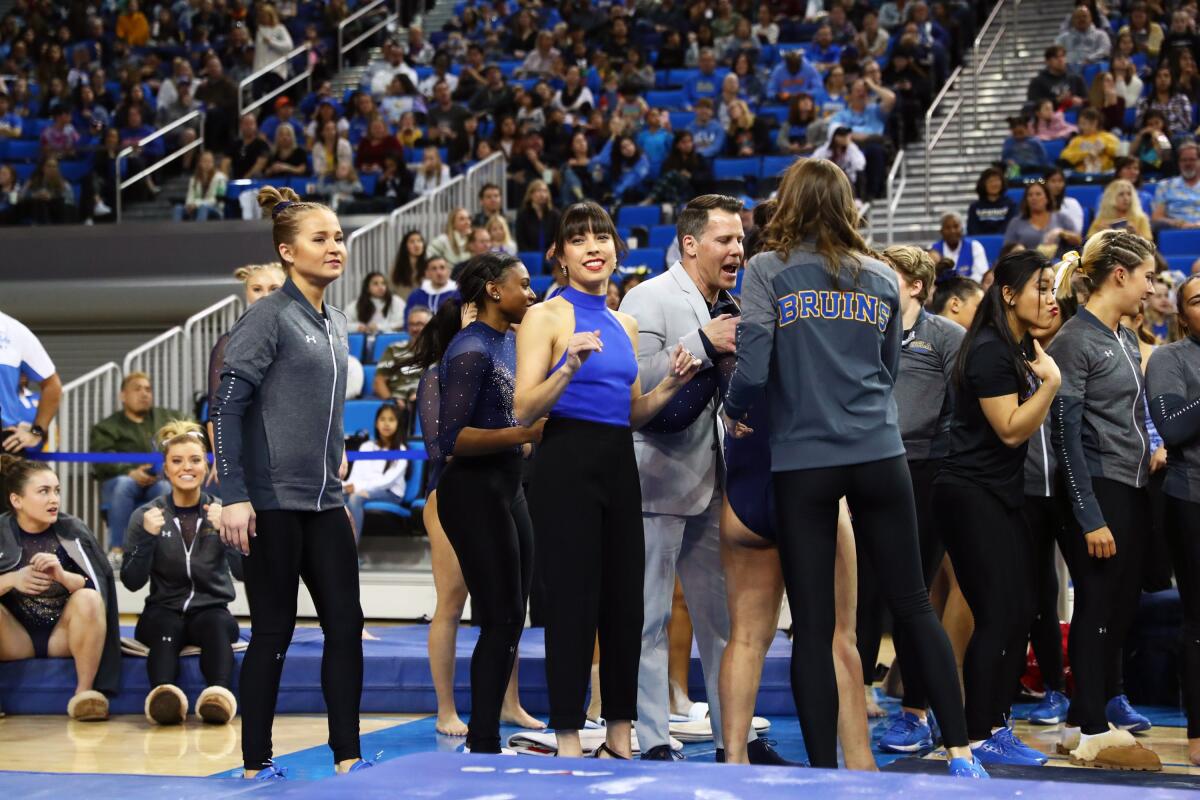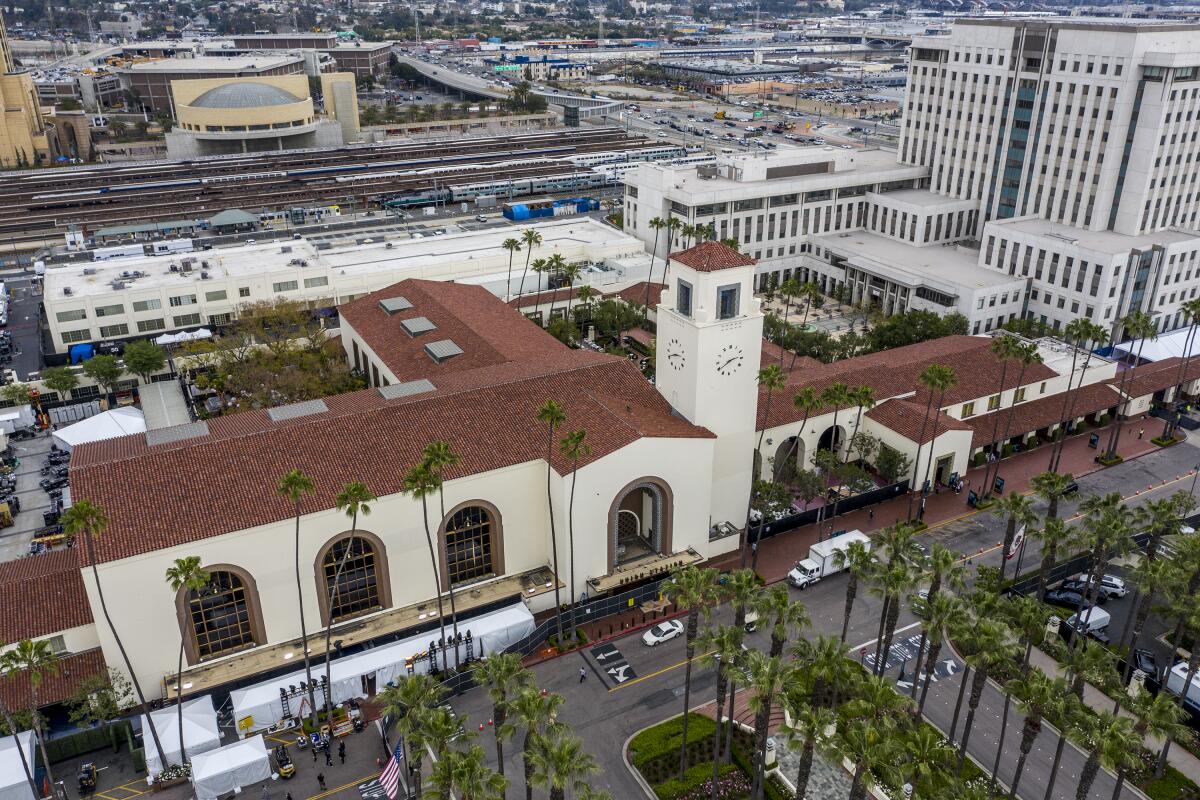The truth about California’s promise to clear marijuana convictions

- Share via
Good morning, and welcome to the Essential California newsletter. It’s Tuesday, Jan. 18. I’m Justin Ray.
When California voters legalized cannabis for recreational use in 2016, there also was a push to create a process for clearing many past marijuana-related convictions or reducing them to a lesser charge.
It was exciting news for reform advocates, who hoped the move would help to unravel the legacy of the nation’s war on drugs, which was disproportionately waged on poor people and communities of color.
Well, things haven’t gone according to plan.
Despite a 2018 law that was meant to speed up and automate the process, tens of thousands of Californians still have pot-related felonies, misdemeanors and other convictions on their records, a Los Angeles Times investigation found.
“At least 34,000 marijuana records still have not been fully processed by the courts, according to an analysis of data provided by court officials throughout the state. The number was more than twice that in August, before The Times began questioning the slow processing times,” according to the report.
These marks on people’s records, of course, can torpedo efforts to get jobs, professional licenses, housing, loans and other situations in which background checks are required.
California Atty. Gen. Rob Bonta, who wrote the law to clear criminal records while he served in the state Legislature, acknowledged problems with its implementation.
“It’s not acceptable. It’s taking too long,” Bonta told The Times in an interview.
The Times identified the area in California with the lowest clearance rate and explored the barriers to speeding up the process.
Related reading:
Illegal pot invades California’s deserts, bringing violence, fear, ecological destruction.
Before his corpse was dumped in a shallow grave 50 miles north of Los Angeles, Mauricio Ismael Gonzalez-Ramirez was held prisoner at one of the hundreds of black-market pot farms that have exploded across California’s high desert in the last several years, authorities say.
And now, here’s what’s happening across California:
Note: Some of the sites we link to may limit the number of stories you can access without subscribing.
L.A. STORIES
In her first two years as UCLA’s choreographer, Bijoya “BJ” Das has set the internet aflame with three viral floor routines. “Somehow, I think the routines are the best they’ve ever been,” coach Chris Waller said. Los Angeles Times

Our daily news podcast
If you’re a fan of this newsletter, you’ll love our daily podcast “The Times,” hosted every weekday by columnist Gustavo Arellano, along with reporters from across our newsroom. Go beyond the headlines. Download and listen on our App, subscribe on Apple Podcasts and follow on Spotify.
POLITICS AND GOVERNMENT
The Justice Department is arguing in court that immigrants who were forcibly separated from their families by the Trump administration are not entitled to compensation for the actions of U.S. officials. In a case filed by migrant families in Pennsylvania, DOJ lawyers argued in a filing this month that the U.S. government is shielded from the families’ demands for payments and asked the judge to dismiss the lawsuit. A similar motion to dismiss was filed in a case filed in California, and the DOJ is expected to follow the same strategy in other lawsuits. Washington Post
Kevin de León, working to clear homeless encampments, wages an escalating fight with activists. The Los Angeles city councilman has focused much of his energy on reducing the number of encampments in his Eastside district, working with city agencies to move people off the streets and into temporary housing or other forms of shelter. Those efforts have put De León in conflict with some of the city’s most outspoken homeless advocates, who say he is pursuing a policy of “banishment” for L.A.’s unhoused. De León, a candidate for mayor, fired back last week. Los Angeles Times
CRIME, COURTS AND POLICING
Sign outside of a police station sparks backlash. When two outspoken critics of the LAPD went to the Wilshire Community Police Station last week, they found a note taped to the locked doors claiming the station was closed due to “defunding.” A photo of the sign was posted on social media, and many Twitter users pointed out that last year the Los Angeles City Council voted to increase the LAPD’s already substantial budget. When contacted about the sign, LAPD Chief Michel Moore said “clearly posting a sign like this is inappropriate.” He added: “Out of respect to our people I recognize someone other than a member of this Department may have posted this in an effort to embarrass us. However, if we identify that a member of this organization is responsible, disciplinary action will be taken.” LA TACO
Stopped by police in San Diego? A lot depends on where you live, drive. A San Diego Union Tribune analysis shows that more traffic and pedestrian stops were made in areas with large minority populations than in mostly white areas with similar crime totals. Just over 60% of the police beats that had high numbers of stops per crime were in areas where more than half of residents are people of color. I recently published a story about police/pedestrian stops that showed similar disparities in the whole state. San Diego Union-Tribune
A nurse who was attacked while waiting at a bus stop at downtown Los Angeles’ Union Station has died, according to officials. The attack Thursday morning was unprovoked, authorities said. Los Angeles Times

Support our journalism
HEALTH AND THE ENVIRONMENT
Residents of Sunnyvale, Calif., are fed up with disruptive crows in downtown. Mayor Larry Klein told CNN that the number of crows has grown during the pandemic and the birds now pose a problem for restaurants and other businesses, as well as a noise nuisance for residents. After trying many other tactics to get rid of the crows, the town is now moving to laser pointers. City staff and residents will be armed with the lasers. “The cost of bringing in a falconry person is actually fairly high long term, and here we are mainly talking about a $20 solution and some staff time, to have a pilot program to try to resolve the problem,” Klein said. CNN
Vaccination is a thorny subject for youths. For teenagers, a central decision of this pandemic — whether to get vaccinated — is often not legally theirs to make. Parental consent laws for vaccinations vary by state and region. That hasn’t stopped some teens from creating organizations to help encourage people to get their shots. “I was a freshman when the pandemic started and I’m graduating next year,” said Ani Chaglasian, a junior from Glendale, sighing. Los Angeles Times

CALIFORNIA CULTURE
Man recounts helping two elderly men escape SUV crash. Mike Tavarez didn’t understand why power lines above him were swaying as he drove one afternoon last week. But he soon came upon the cause and he realized lives might be in danger; an SUV was sideways in a ditch after appearing to have hit a utility pole. Tavarez jumped out of his vehicle to help and, seeing a man on the driver’s side in trouble, worked to pull him out. More good Samaritans gathered to aid in the rescue. “I knew the cavalry had come, and we’re gonna get this done,” Tavarez said. He said the people who helped, as well the victims, all hugged and thanked one another. Modesto Bee
The rise and fall of Esprit, San Francisco’s coolest clothing brand. In the 1980s and ’90s, Esprit appealed to the youth with a message of lefty, post-racial harmony. It famously asked youths “What would you do to make the world better?” and turned their responses into an ad campaign that ran on MTV and 11 other channels. “Give back the land stolen from Native Americans,” one ad demanded. “I’d keep a woman’s right to choose, unless George Bush is free to babysit,” read another. “With the logo’s omnipresence at the time, it may as well have been Supreme for the teens of the late ’80s and early ’90s,” SFGATE says, referring to a popular brand today. However, the brand’s decline can be linked to its internal turmoil, including “brutal corporate takeovers and tumultuous divorces.” SFGATE
Free online games
Get our free daily crossword puzzle, sudoku, word search and arcade games in our new game center at latimes.com/games.
CALIFORNIA ALMANAC
Los Angeles: 65 San Diego: 63 San Francisco: 53 San Jose: 61 Fresno: 64 Sacramento: 60. Have you heard of this Twitter account? If so I’m sorry now you are gonna be hunting for the cat daily.
AND FINALLY
Today’s California memory is from Cecile Marie:
It was the spring of 1960 in San Bernardino. I was in the first grade and it was a time when children could walk alone to and from school. My memory takes me to a public swimming pool. I went with some friends and cousins. My hair was in long beautiful braids and I decided to loosen them while sitting on a bench by the pool. A white teen-aged boy came and sat next to me to call me n***** and tell me I was ugly. I left to be closer to my friends. I never told my mother. I blamed myself for the attack for having loosened my hair, which had gotten bushy after being set free. Not to mom’s liking. It was the first time, not the last, certainly, I have been attacked or humiliated for being born in a Black body.
If you have a memory or story about the Golden State, share it with us. (Please keep your story to 100 words.)
Please let us know what we can do to make this newsletter more useful to you. Send comments to essentialcalifornia@latimes.com.
Sign up for Essential California
The most important California stories and recommendations in your inbox every morning.
You may occasionally receive promotional content from the Los Angeles Times.







